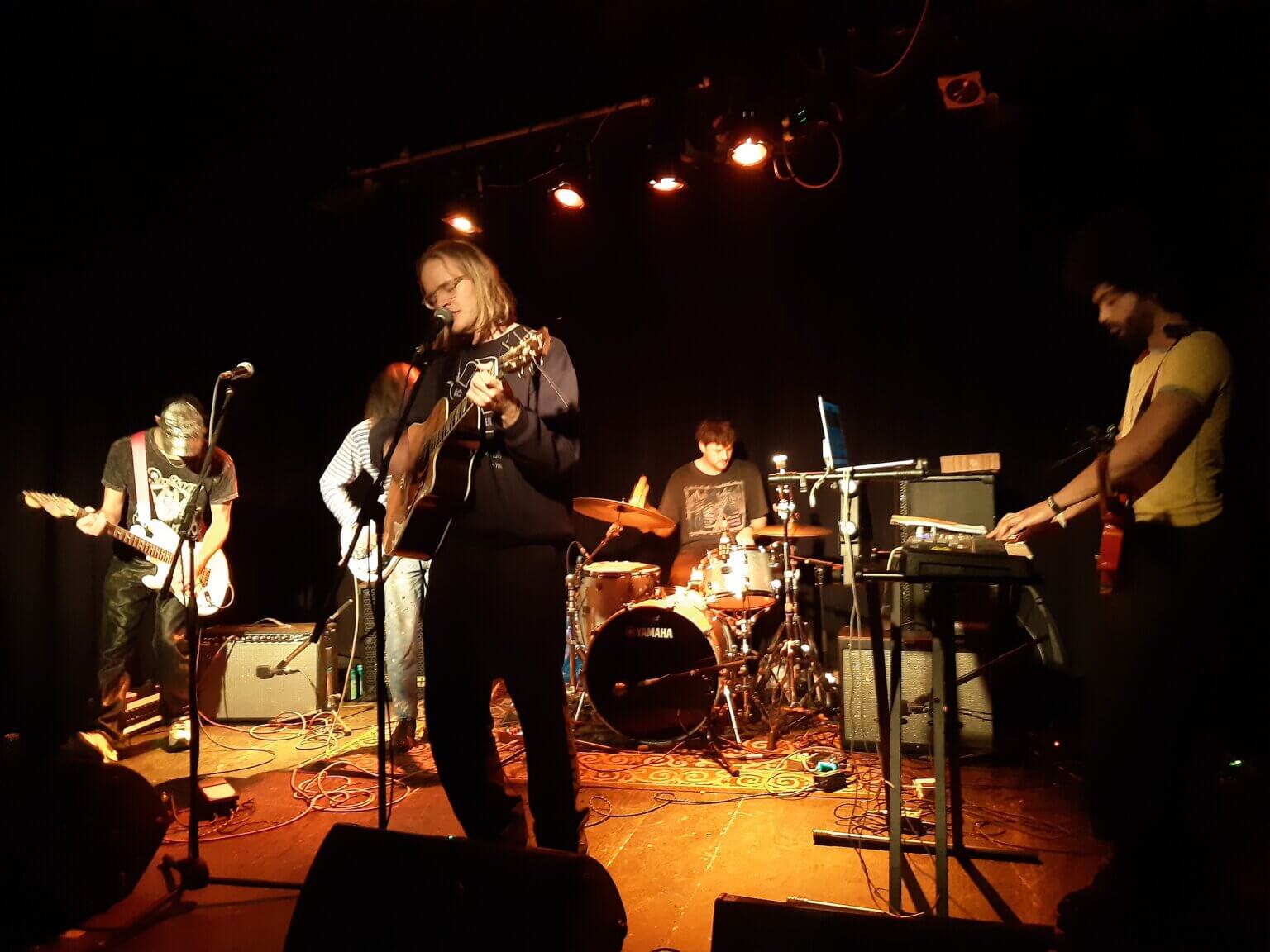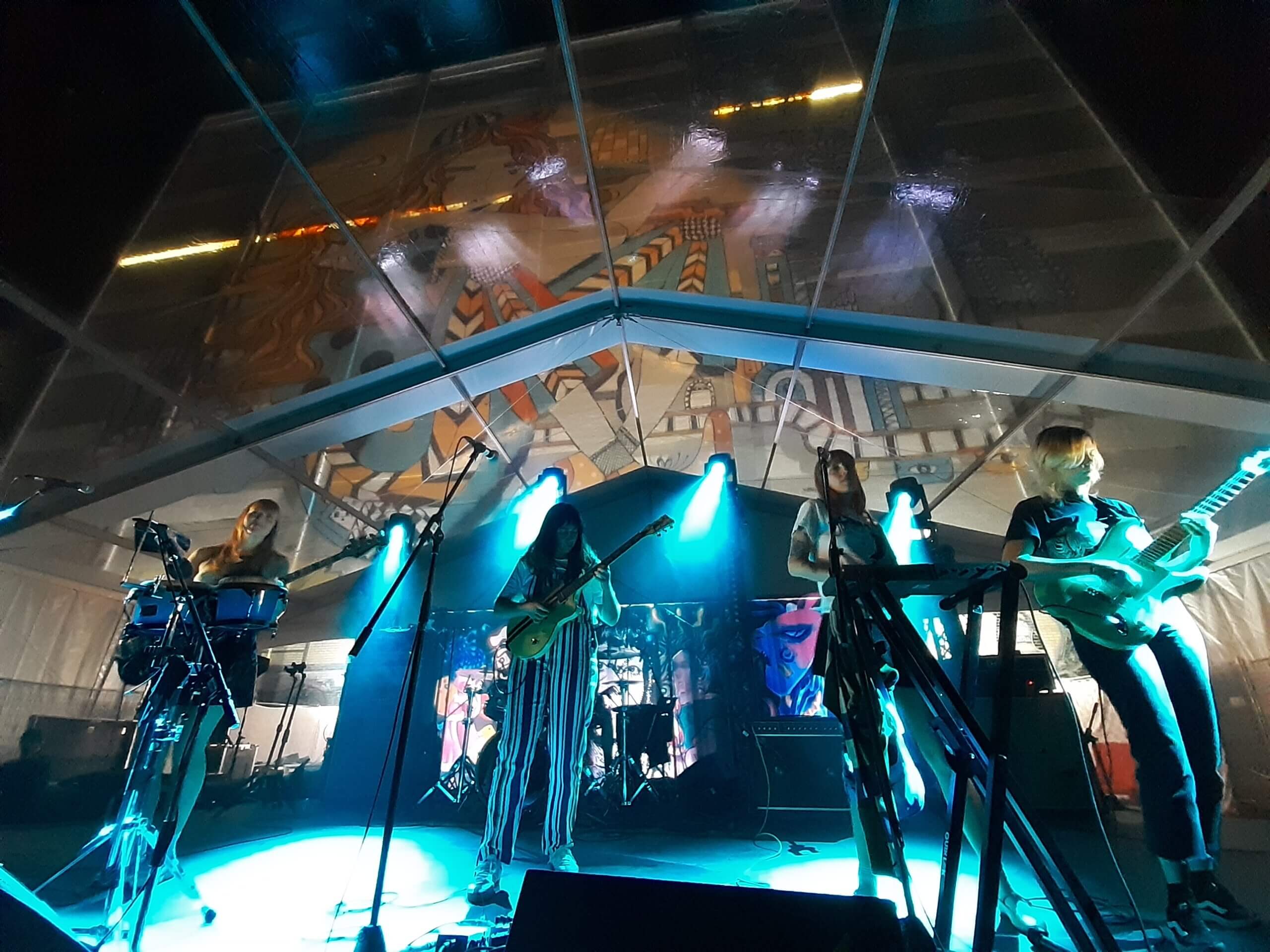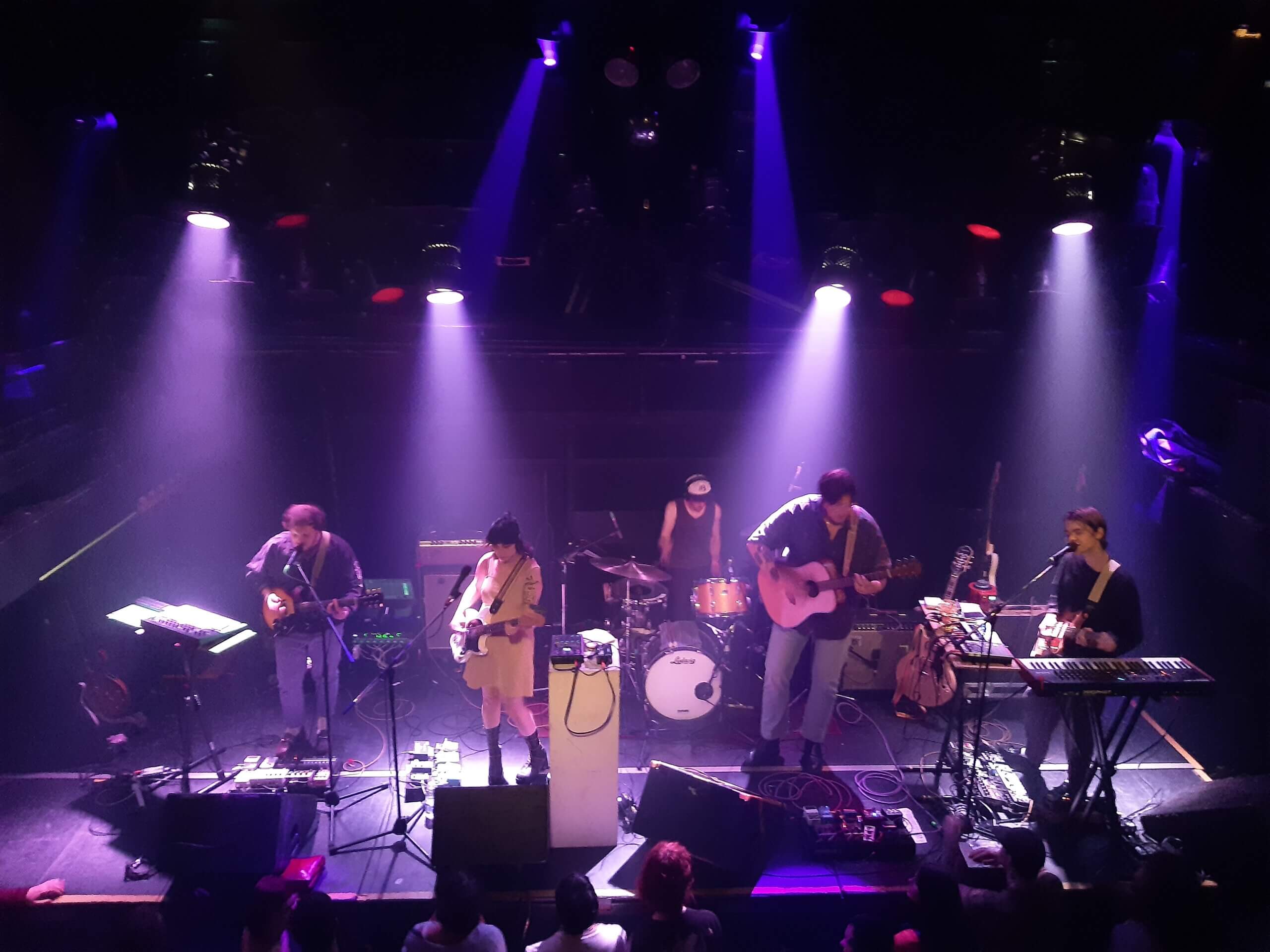POP Montreal 2024 Recap

You may not have been aware of this, but last week was Christmas in Montreal. I had no idea myself, until cycling up Park Avenue on Wednesday when I kept seeing the C-word flash by me from strange minimalist posters pinned to lampposts, electric boxes and the doorways of abandoned buildings all along the street. Bit early, I thought, somewhat piqued, it’s not even Hallowe’en yet. But as I was locking my bike to a bollard I looked up and saw one of these posters up close and had to smile: “Hipster Christmas Is Here!!” it said, “September 25th to 28th”. It dawned on me even before I saw the orange sunburst logo in the bottom corner that the hipster Christmas being referred to was of course Montreal’s premier annual indie music festival.
POP Montreal, For music lovers, ‘twas indeed the season to be merry. Inspired by city-wide festivals like SXSW, POP involves some 200+ shows taking place in more than 20 venues over the course of 5 days, not to mention film screenings, stand up comedy, art exhibits, talks on subjects ranging from the future of independent music venues to Palestine, as well as curated events for kids and a massive arts and crafts flea market in the basement of a church. The majority of the action happens up in the bustling Mile End – Plateau Mont-Royal neighbourhood with its dizzying profusion of restaurants, bars and boutiques and the shows themselves take place in some of the city’s most iconic indie venues — such as L’Esco, Casa de Popolo, La Sala Rossa — some newer additions to the roster, like Ursa, the cultural venue opened by Martha Wainwright in 2019, and dive bars such as Quai des Brumes and Hemisphere Gauche that have music in their DNA. The outdoor stage, Le Marché des Possibles, was located in a vacant lot by the CN railroad a couple of blocks east of Main and, over on Park, the grandiose Rialto Theatre, once upon a time an old movie palace, served to all intents and purposes as the festival hub.
The only venue not within the hip Plateau-Mile End bubble was Foufounes Electriques, the punk and metal club on St Cath famous for being the place Nirvana played back in 1991 while touring the release of Nevermind, and this was the place where I caught my first shows of the festival: a double-bill featuring LA dream pop quartet Winter and The Spirit Of The Beehive, the Philly ‘deconstructionists’ whose every song, you might say, is the musical equivalent of a fractured narrative.
The Winter set was daydreamy and dynamic, the guitar sounds soaked in deliquescent chorus and quavering flange, with reverb adding a sense of depth, of expanse. This was music full of tension and expectation, the lilting arpeggios and luscious melodies riddled with little bursts of dischord, distortion and noise, creating a hazy space through which the voice of magnetic singer Samira Winter drifted like something that was both far off and intimately close, a voice that could be full of warmth but at the same time as cold and distant as their name suggests. It was dream pop alright, but with a hard edge, and there were occasional excursions into what felt like the trip hop territory of Portishead and Massive Attack. It was a captivating opening spectacle.
The Spirit Of The Beehive were something else entirely, though somehow not a million miles off either. Dream pop, indie rock, neo-psych, slowcore, experimental… it was all of this and yet none of this; they could blast out a banger, drown you in sludge, transport you into the slow vastness of space, but they don’t do any of these things for very long, not allowing you to settle into any particular comfort zone. Often changing instruments and adjusting tunings mid-tune, genre-hopping from one sequence to the next, this is a band that is modernist at heart, completely eschewing conventional song forms. The songs are non-linear and intricately constructed, the arrangements protean and unpredictable which, when coupled with the layering of effects and instrumentation, creates an effect that is almost kaleidoscopic, psychedelic in a cinematic sense, bringing to mind the desultory visuals of an Adam Curtis documentary or Tarkovsky movie, rather than the 1973 Spanish film they take their name from. It all merges together — somehow, incredibly — into what feels like one complete piece of music. But paradoxically, by the end of their hour-long set, you feel like you’ve seen ten bands instead of just one.
While POP was in full swing over in Mile End, one of the most poignant events in the Montreal music scene in recent years, unrelated to the festival, was taking place on the other side of town. On Thursday night hundreds of people took to the streets to protest the closure of one of the city’s oldest and most important venues, La Tulipe, which was forced to shut due to noise complaints from residents of a neighbouring condo that resulted in a court ruling that the music hall — which has been there since 1913 — no longer had the right to use its sound system because the noise was audible in the adjacent block. Completely shutting down the intersection at Mont-Royal and Papineau, protesters showed their support for the city’s cultural heritage and voiced their fury at this latest in a slew of venue closures that in recent years has seen places like the beloved Divan Orange disappear from the cultural landscape of Montreal altogether.
If Montreal’s vibrant music scene is under threat, as it seems to be, it makes festivals like POP Montreal all the more important, all the more necessary, and it was great to see that most of the artists who played here over the 5 days played to packed houses. Support for the arts scene here is alive and well, and long may it continue.
My ears still ringing from the din of the protest outside La Tulipe, I headed back across town to the Rialto for the Beverly Glenn Copeland show. I arrived to Northeastern Ontario singer-songwriter Mimi O’Bonsawin warming things up as the crowds poured in to fill the hundred year-old, almost 1200 seat theatre. The rustic roots artist played folk pop for an easy-listening audience, with tunes designed to be uplifting, to tug on the heartstrings, to conjure images of wooded groves and the unspoilt wilderness — literally, I might add, the pauses between tunes soundtracked by ambient birdsong and the sound of running water. At one point she plucked a harp strapped to her with a harness that had angel or butterfly wings glued to it (or possibly rhubarb fronds, from where I was sitting I couldn’t be sure). It all felt a bit, I don’t know, saccharine. I could use other words to describe it, but I won’t. Suffice to say, I was starting to wonder what I’d let myself in for, suddenly regretting not choosing one of the edgier, more banging options from the night’s eclectic line-up. However, Copeland’s appearance put paid to those fears in an instant.
Arriving onstage to a standing ovation and wave upon wave of applause that he clearly found overwhelming, it felt like being in the presence of greatness, witness to a cultural event of superlative significance. Despite being frail due to age and seated for most of the performance because of a recently-sustained leg injury, Copeland, backed by a 9-member choir, exuded a humble charisma that outshone the stage lights and sang a selection of songs from his 50+ year repertoire of folk, jazz and ambient in a sumptuous vibrato that was quite stunning. Cringing earlier in the evening at O’Bonsawin’s waxing lyrical about the beauty of nature and her chat about life being this wonderful gift (does she ever read the news?), I started to think maybe she had a point. With softly brushed percussion, soaring choral whispers and dulcet piano, the music was both pastoral and gospel in tone, a kind of emotive, holy minimalism that functioned as a vehicle for Copeland’s operatic and transcendental voice. Announcing mid-set that this would be his last proper tour, and perhaps his last show in Montreal, it was one I was glad not to have missed.

Los Bitchos at POP Montreal photo by Stephen Deane
Leaving the opulent Rialto Theatre to head to a semi-basement dive bar on Saint-Denis, the shift in atmosphere from one show to the next could hardly have been more drastic. There are few venues more cramped and sweaty than L’Esco filled to capacity and for Atsuko Chiba it was packed to the gills. Trying to get to the bar was a hopeless endeavour, to say nothing of getting to the bathroom — the layout of L’Esco is like a New Orleans shotgun apartment with half a dozen families living in it, every one of whose bedroom you have to pass through to get to the toilet. Not that it mattered much, as the Atsuko set was oddly brief — clocking in at just over half an hour — but they were as good as ever, the gloomy catharsis of their psychedelic, postapocalyptic post rock a rousing, darkly uplifting experience.
From one cramped basement to another, the night’s action continued over on Saint Laurent with Halifax indie outfit Nap Eyes at La Sotteranea, though here it was the stage rather than the room that was claustrophobia-inducing: a small square of raised space with such clusters of cables and stray wires strewn across it that every time one of the performers tried to move around I felt that lurching anxiety you feel when an elderly person stands up to get off a bus that is still moving and about to go round a corner.
As the event was running late, I had the misfortune of catching the last half of Suncream or Sunlounger or some such slippergazey thing that was just about emo enough to barf to, but the Nap Eyes show proved to be one of the highlights of the entire POP festival. The uptempo strumming of an acoustic guitar merged nicely with some Fender country twang, the warble of a whammy bar, and some seriously moreish soloing. The lyrics were often wistful and reflective and if their everyday poetry wasn’t enough to prove Nap Eyes’ obvious literary credentials, we were treated to some Pushkin and W.B. Yeats as well. In vocalist Nigel Chapman they have one of the most endearing frontmen in the business, his wonderfully awkward charm a welcome change from the stuck-up silences or nauseating braggadocio that are all too common at gigs. He alluded to some behind-the-scenes issues that had prevented the band from being able to get together much recently, and though they did sound a little loose at times and there were a few bum notes and false starts here and there, his is such a bashful and winsome personality no one cared. When they made a mistake they went with it and made the audience laugh with such congenial self-deprecation that the fuck-ups, in the end, were all just part of the fun.
One of the problems of POP is a problem faced by all music festivals to a greater or lesser extent: scheduling. Timetable conflicts that mean that in order to see one band you have forego the opportunity to see another that you want to see just as much. It is perhaps to be hoped that at a festival taking place over 5 days and involving over 20 venues, most of which are a short walk or quick Bixi ride from one another, this is something that could be if not altogether avoided then somewhat minimised. But in a way the problem is more acute, not least because much of what’s on offer is similar in genre and appeals to similar tastes and on Friday and Saturday in particular there were a glut of bands all playing at the same time and deciding what to see involved much triage and some very tough choices.
I certainly questioned some of my decision-making as regards that, but of what I did see there were a couple of notable highlights. The international, instrumental, cumbia-slash-surf- slash-Anatol pop group Los Bitchos rattled through a slew of their rowdiest numbers to a keen crowd at the outdoor venue Marché des Possibles, before ceding the stage to veteran garage rock legends The Fleshtones. It was an interesting match up and it worked perfectly, with the youth and spirit of Los Bitchos, whose music in a way sounds like the distillation of the eclectic playlists of its cosmopolitan members, contrasting nicely with the tried and tested, trusty sound of their NYC counterparts, loyal to the genre, true to their roots.
The action on the Saturday would continue into the wee hours of the morning and the festival would culminate in a tribute to late local folk legend Lhasa de Sela on Sunday, but for me it ended with the superb Nabihah Iqbal, playing the Rialto Hall — one of the smaller upstairs venues in the Complèxe Rialto — just before midnight on Saturday. It was a venue I’d never been to before and certainly one that is underused, a small but impressive hall replete with chandeliers, gilded mirrors, red velvet curtains and huge windows overlooking Park Avenue, three floors below. Performing as a duo — she on synths, another musician on guitar and sax — Iqbal, a UK artist with Pakistani heritage, instantly won the crowd over with banter in better French than some of the city’s anglophone inhabitants can boast of, and for all that it was her first proper performance in Montreal (she has DJ’ed here before) she was in her element and appeared as at ease as if she’d grown up in the place. Many of the songs were introduced with a bit of a back story and she turned out to be quite the raconteur, revealing that her best-known song “The World Couldn’t See Us” was inspired by Thomas Hardy’s Tess of the D’Urbervilles, the most depressing book, she said, she’s ever read. Quite a bit of her chat broached dark subjects such as death and suicide but she did so fearlessly and skillfully and not in a way that made the atmosphere heavy or detract from the essentially joyous nature of the music, which at times channels bands like New Order and the Cocteau Twins and at others goes full-on Chicago house. In performance it didn’t deviate a great deal from her recorded output but this was no bad thing; the best moments were her better-known, spoken-word tracks such as “Zone 1 to 6000” and the aforementioned “The World Couldn’t See Us”, as well as the brisk one-two of trance and techno infused numbers off her recent album DREAMER, “Gentle Heart” and “Sky River”, the latter of which, when she launched into it live, I thought was about to be a rendition of “Born Slippy”. That it wasn’t, however, didn’t prove to be too much of a disappointment.
While the bigger events such as Osheaga and the Montreal International Jazz Festival get all the media attention and most of the visitors here, POP Montreal is a much better barometer for what the city is all about. While its above-ground music scene is huge and no doubt ludicrously lucrative, it’s down underground one finds a true indication of a city’s musical and cultural health and Montreal in that respect is in fine fettle. In spite of the recent closures that have seen the city lose not just La Tulipe and Le Divan Orange but smaller indie venues such as the Diving Bell Social Club, La Vitrola and Café Le Cagibi, the underground music scene here remains vibrant and effervescent, abundant and diverse — irrespective of genre. The POP schedule was so packed it made your head spin but it was by no means the only thing happening, there were plenty of other PWYC shows taking place, as ever, at some of the city’s stalwart leftfield institutions such as Barfly and Le Cheval Blanc.
Whether it’s bluegrass you’re into, or gypsy jazz, rockabilly, grindcore, psych folk, yé yé, death metal, this city doesn’t just have it, it has a scene. Music of all kinds thrives here. And while POP might skew indie and every subgenre of its titular category that you can put a name to, this is a festival that goes some way to encapsulating that eclecticism and abundance and, more than any other, manages to capture the vibe, vibrancy and variety of the city as a whole.
And while rents continue to rise and the cost of living skyrockets, threatening to one day turn Montreal into the No Fun City of the east, that possibility is still quite a ways off yet; and while it might be a bit too hyperbolically doom and gloom to say come to POP Montreal next year and enjoy the fun while it lasts — rather come and support it so that it does last. Come and spend hipster Christmas with your extended indie rock family. You never know, you might even find yourself wanting to move in.

Spirit of the Beehive at POP Montreal 2024 photo by Stephen Deans
Words by Stephen Deane
Read more about POP MONTREAL HERE
Latest Reviews
Tracks
Related
Sorry, we couldn't find any posts. Please try a different search.
Advertisement
Looking for something new to listen to?
Sign up to our all-new newsletter for top-notch reviews, news, videos and playlists.




